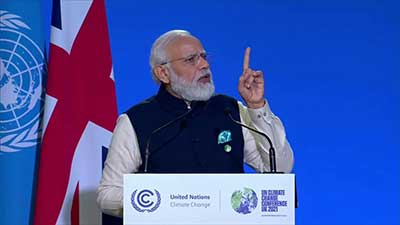Relevance: GS-3: Global groupings and agreements involving India and/or affecting India’s interests; Infrastructure: Energy
Key phrases: Panchamrit, UNFCCC, CoP 26 Glasgow, Nationally Determined Contributions (NDCs), carbon capture technologies, decarbonisation drives, clean fuel switch, Mission 500GW plan.
Why in News?
- A debate has emerged in the government over explicitly committing to the 500GW renewable energy target and plans for reduction of one billion tonnes of cumulative emissions by 2030 in the soon to be updated Nationally Determined Contributions (NDCs) or climate targets.
Key Points:
- A template was set at the COP-26 Glasgow talks in October 2021 by Prime
Minister, whereby, apart from announcing India's commitment to a 2070 net
zero target, the PM said that by 2030 India would ensure that 50% of its
electric power installed will be through non fossil fuel sources
besides achieving 500GW of non fossil fuel electric power.
- Currently, India has a capacity of approx 101 GW. To meet the target, approximately 400 GW of RE is to be added.
- Every country is expected to submit its post 2020 climate targets or NDCs towards achievement of the Paris Agreement. While India is set to overachieve on its 2015 NDCs, it is yet to submit its new and updated NDCs for 2030.
-
Prime Minister proposed a five-fold strategy for India to play its part in helping the world get closer to 1.5 degrees Celsius on the first day of the global climate meet in Glasgow.
-
The scheme, euphemistically termed as ‘Panchamrita’ meaning the ‘five ambrosia’, includes:
- India will get its non-fossil energy capacity to 500 gigawatt by 2030
- India will meet 50% of its energy requirements till 2030 with renewable energy
- India will reduce its projected carbon emission by one billion tonnes by 2030
- India will reduce the carbon intensity of its economy by 45% by 2030
- India will achieve net zero by 2070
-
- The government will soon be taking a proposal to the Union Cabinet on updating of India's NDCs, an exercise expected to be completed well in time for the December COP-27 meet in Egypt.
Issues:
- The Ministries of Power and New and Renewable Energy among others
are learnt to have cautioned against mentioning both commitments in the
updated NDCs.
- The ministries argued that while the PM's announcement must be respected and adhered to as a domestic target for the country, there was no need or compulsion to include it as NDC targets.
- The reason cited is that India could lose flexibility on its climate goals if it binds itself in absolute global commitments to the United Nations Framework Convention for Climate Change (UNFCCC) even as electricity demand remains dynamic and carbon capture technologies are yet to be realised fully on a large scale basis.
- They are learnt to reason that an NDC assuring 500GW commitment, while it will automatically cover the 50% target, will also bind India to the absolute target even if overall demand for electricity in the country does not grow commensurately by 2030.
- That apart, a 500GW NDC target will also prevent any new renewable energy project to be counted towards international carbon markets as Article 6 of the Paris Agreement only counts projects outside of NDCs. However, to achieve the 500GW RE target, practically every RE project will need to be included.
- The second proposal being cautioned about is regarding the announcement
of achieving a one-billion-tonne reduction in India's cumulative
emissions from 2021 to 2030.
- India's carbon dioxide emissions stand at about 2.8 giga tonnes (GT) currently and are projected to touch 4.48 GT by 2030 as per projections made by the environmental think tank Centre for Science & Environment.
- To shave off one billion tonnes will require massive decarbonisation drives and mandates for clean fuel switch even as technologies for such large scale switch are untested so far.
- Stakeholder ministries have red flagged that such an absolute commitment in NDCs will invite intense global scrutiny of these targets even as the country is at a crucial stage of development which will involve some increase in Green House Gas emissions.
- India's announcement to reduce emission intensity of the country's GDP by 45% by 2030 as compared to 2005 level, however, will be able to accommodate any such ambition if achieved and hence the nation's commitment to the cause will be clear as well, it is argued.
Way Forward:
- India’s current trajectory displays that it has added an average of 8GW of RE per annum, excluding 2020 when it added 12GW. Hence, making an addition of about 40GW per annum is huge and needs to be planned out systematically.
- The Indian government has drawn up a ‘Mission 500GW’ plan to
ensure India is able to extend its scope of renewable energy (RE) to 500 GW
by the year 2030.
- To come up with a full-proof plan of action, a committee will be set up to drive efforts in this direction at the ministry level to help India achieve its goal of reaching 500 GW of RE by 2030.
- The panel will determine issues such as storage requirements, the energy mix being put to use for the 500 GW target, kinds of technologies to be used and the issues of transmission.
- To make sure that the regulatory framework is upto-the-mark for the scale up of RE, the panel will also try to rope in foreign investment into the sector.
- Initially, the target was 450GW RE – out of which, 280GW RE would originate from solar power and the 140GW from wind energy.
- Other remaining would come from different energy sources. There will also be a mix of hydrogen and biofuel present in the area remaining.
Source: Economy Times
Mains Question:
Q. India risks losing flexibility on its climate goals by binding itself to the absolute global commitments of the UNFCCC. Analyse critically.









